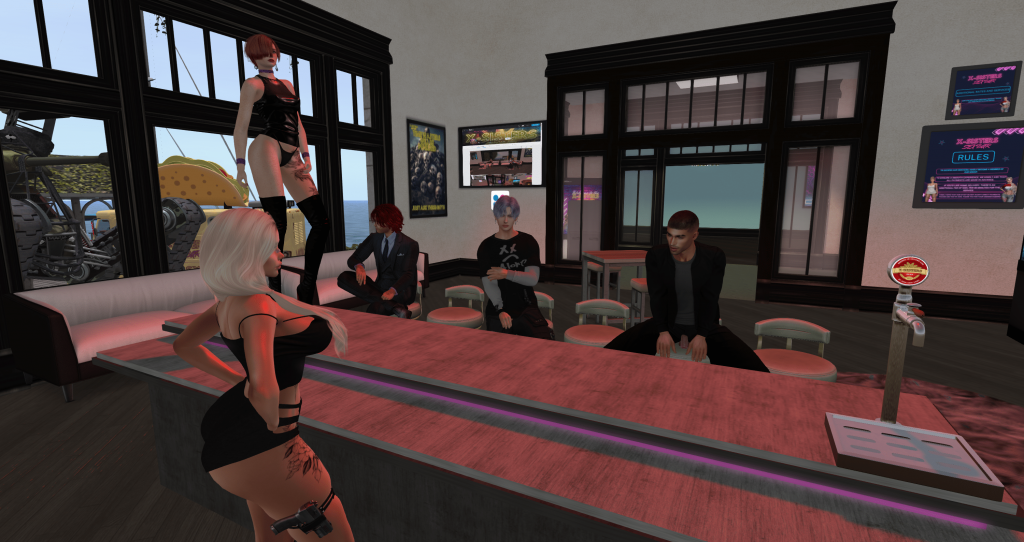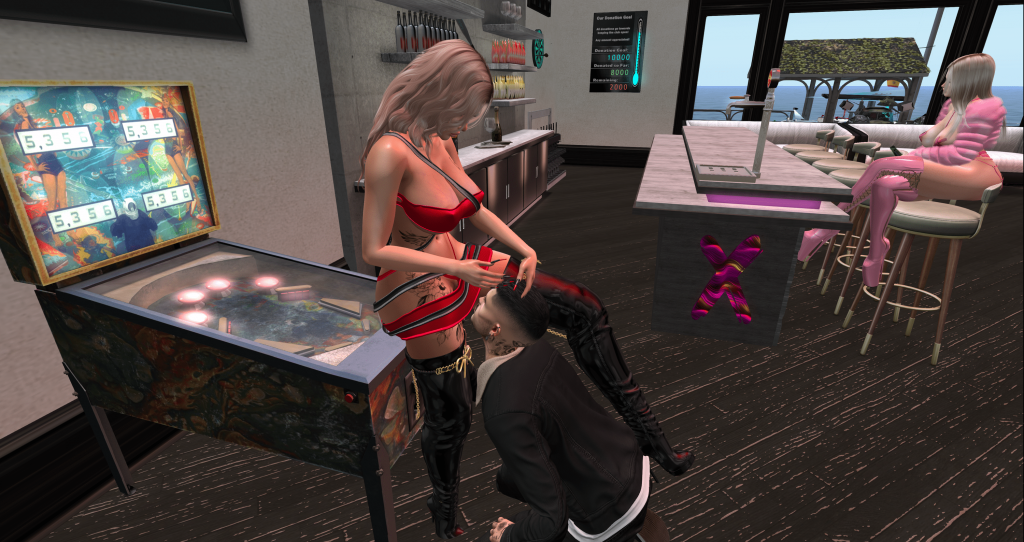Last Updated on: 6th July 2023, 05:24 am
What is the interplay between the virtual economy and the world of Second Life sex and sex work? For the uninitiated, Second Life is a popular virtual world, where you can create avatars, explore virtual landscapes, and engage in a wide selection of activities, both social and economic. Within the world, an economy thrives, fueled by the in-world currency, the Linden Dollar (L$). This opens up a world of possibilities, including commerce, entertainment, and yes, even sex work. So what is the impact of Second Life sex and sex work on the virtual economy?

The World of Second Life Sex and Sex Work
Before we really dive into the economic ramifications, let’s get a hold of the essence of Second Life’s adult entertainment industry. In -world, residents have the freedom to express themselves, explore fantasies, and connect with like-minded individuals. But why do people flock to engage in Second Life sex and sex work? It’s simple, escapism, personal exploration, and living out fantasies that might remain out of your reach in the real world.
Second Life’s adult entertainment industry is as diverse as it is lively, with people engaging audiences through creative performances. Whether that is dancing in a club, being a stripper, being a street prostitute or a high-class escort. Sex in Second Life is entertainment.

The Economics of Second Life Sex | Virtual Economy
So what are the economic aspects that underpin Second Life sex and sex work?
In-Game Currency and Transactions | Virtual Economy
Money makes the virtual world go round too. Second Life’s currency, the Linden Dollar, drives transactions within the world, whether it’s on the marketplace, at stores or one on one payments. Sex workers skillfully market their services, earning L$ for their performance.
Earning Potential for Sex Workers | Virtual Economy
It varies. Just like in the real world, popularity, presentation, and professionalism play key roles in any sex worker’s success. Top earners make unforgettable experiences, leading to loyal clients and lucrative income. It’s why I drive a storyline even for those thirty or sixty minutes. Low earners are those that can’t adapt, can’t bring something new or pick up on a customer’s tell.

Legal and Ethical Considerations
Amidst the extremely liberating nature of Second Life sex, certain guidelines and ethical boundaries are essential.
Community Guidelines and Restrictions
Second Life enforces community standards to ensure an enjoyable and safe experience for all users. Striking the right balance between freedom and responsible behaviour is a constant challenge for many people.
Addressing Consent and Online Safety
Virtual or not, consent remains paramount. Implementing consent mechanisms and educating users about online safety are crucial in fostering a secure environment for all. Even in the darker roleplay such as virtual rape roleplay, consent is still required.

The Influence on User Engagement
Sex and sex work can and does spark debates, but they also influence user engagement in a lot of ways.
User Retention and Attraction
Let’s face it, adult-oriented content attracts users. It’s like a magnet that keeps them coming back for more. Human nature is a complex tapestry woven with a strong curiosity and desire. Second Life provides that unique space where you can escape the restrictions of the real world and immerse yourself in a world where boundaries are redefined. The allure of adult-oriented content lies in its ability to offer an escape. It presents an opportunity to explore aspects of your personality that might be suppressed in everyday life.
Community Building and Social Dynamics
While one might assume that adult-oriented content remains a solitary pursuit, it surprisingly becomes a catalyst for connections and making tightly-knit relationships. Contrary to conventional beliefs, the adult entertainment sector within Second Life isn’t isolated or exclusive; it thrives within a diverse and inclusive ecosystem. When residents don’t carry the burden of societal expectations or judgment, it allows them to form connections without prejudice. That sense of freedom and acceptance becomes a powerful force in community building.

Second Life Virtual Economy and Real-Life Economy Connections
The Second Life economy is not entirely detached from reality. In fact, it has tangible connections that bridge the virtual and real-life economies, shaping how users perceive and engage with their digital life.
Currency Exchange and Conversion | Where Virtual and Real Meet
At the heart of Second Life’s economy lies its native currency—the Linden Dollar (L$). Just like any real-world economy, Second Life’s virtual economy is driven by transactions, where residents buy and sell goods, services, and experiences.
What’s truly fascinating is that the Linden Dollar can be converted into real-world currencies, creating that tangible bridge between the digital and physical worlds. This conversion process allows users to translate their virtual earnings into real-world monetary value. As a result, some people have managed to turn their Second Life ventures into a source of supplementary income or even a full-fledged livelihood.
Real Money Trading (RMT) | Blurring Boundaries
While the exchange of the Linden Dollar into real-world currency is a sanctioned feature of Second Life, there exists another phenomenon that blurs the lines between virtual and real economies—Real Money Trading (RMT). RMT involves individuals engaging in the buying and selling of virtual goods and currency for real money outside the confines of Second Life’s authorized mechanisms.
This practice has raised both eyebrows and questions within the Second Life community and beyond. On one hand, RMT has facilitated the emergence of a virtual marketplace, where users can profit from their digital endeavors. It allows entrepreneurs to turn their creativity into a lucrative venture, much like artists selling their creations in the real world.
On the other hand, RMT also brings challenges and concerns. It can create an unregulated market where scams and fraud thrive, leading to negative impacts on the virtual economy’s stability and user trust. Additionally, the blurred boundaries between virtual and real economies can attract the attention of regulatory bodies, raising legal and ethical questions about the impact of virtual transactions on the broader financial landscape.
The Butterfly Effect | Virtual Ripples in Real Economies
The connection between Second Life and the real world goes beyond currency exchange and RMT. The virtual economy, with its ebbs and flows, can also influence real-world businesses, entertainment, and even social trends.
For instance, the success of virtual events and businesses within Second Life can have a ripple effect in the real world. Virtual concerts featuring real-world musicians attract large crowds and garner publicity, ultimately translating to increased popularity and revenue for the artists in the tangible world.
Likewise, virtual experiences and products can serve as testing grounds for real-world innovations. Creative ideas and designs that gain traction in the virtual world might find applications in various industries beyond the confines of the virtual realm.
Virtual Economies as Economic Laboratories
The relationship between virtual and real-world economies has intrigued researchers and economists alike. Second Life and similar virtual platforms provide unique economic laboratories, where scholars can observe consumer behavior, market dynamics, and the impact of various economic policies in a controlled environment.
By studying these virtual economies, researchers can gain insights into how economic principles apply in the digital realm and identify potential lessons that can be implemented in real-world economies.

Controversies and Challenges | Virtual Economy
While Second Life’s adult entertainment sector thrives , it is not without its fair share of controversies and challenges. As the virtual world collides with real-world morality, and exploitative practices loom, addressing these issues becomes paramount to ensure a safe and enriching experience for all residents.
Virtual vs. Real-World Morality | The Clash
The virtual realm offers a canvas where users can paint and explore their deepest fantasies. However, this newfound freedom can lead to clashes with real-world morality and societal norms. What may be acceptable in the virtual world might be considered taboo or offensive in the tangible realm.
The perplexing question arises: Does what happens in a virtual world stay in the virtual world? While some argue that virtual activities should be treated as separate from real-life actions, others believe that there should be accountability for a persons virtual choices.
This clash of virtual and real-world morality raises ethical dilemmas. Striking a balance between individual freedom and responsible conduct becomes essential in building a community that respects diverse perspectives while acknowledging the potential consequences of virtual actions in the real world.
Tackling Exploitative Practices | The Ongoing Battle
Regulating exploitative practices within Second Life’s sex work sector is a complex and ongoing battle. While the virtual world promises liberation and self-expression, it also attracts individuals who may seek to exploit others for personal gain.
One of the major challenges lies in addressing issues of consent and boundaries. Virtual spaces may blur the lines between role-play and real-life intentions, making it challenging to distinguish genuine interactions from predatory behaviour. Ensuring that residents understand the importance of consent and respect in the virtual world becomes crucial to combatting exploitative practices.
Second Life’s creators and administrators play a vital role in implementing guidelines and tools to tackle these issues. The establishment of community standards and clear reporting mechanisms empowers users to address concerns and seek help when faced with exploitative situations.
A Call for Responsible Regulation | Virtual Economy
While the virtual world offers opportunities for exploration and creativity, responsible regulation is necessary to address controversies and challenges effectively. Collaborative efforts between platform administrators, users, and external stakeholders can pave the way for balanced and practical regulations.
Finding the right balance between individual freedom and community well-being is a complex endeavour. By addressing controversies and challenges head-on and engaging in constructive conversations, the vibrant community of Second Life can continue to flourish as an inclusive and captivating realm of self-expression and connection.

Positive Impact on the Virtual Economy | Fueling Growth and Creativity
Amidst the controversies surrounding Second Life’s adult entertainment sector, there are undeniably positive impacts on the virtual economy. From stimulating in-game commerce to driving demand for virtual real estate, the adult industry plays a significant role in fostering growth and creativity within the virtual world.
Stimulating In-Game Commerce | A Boon for Creators and Businesses
Sex work within Second Life acts as a catalyst for in-game commerce, driving economic activity that supports creators, venue owners, and various businesses. Adult-oriented venues, clubs, and businesses attract a substantial audience, drawing in avatars seeking engaging and immersive experiences.
As avatars frequent these venues, they contribute to the in-game economy through transactions for virtual goods and services. Custom avatars, clothing, animations, and accessories catered to adult themes become sought-after commodities, fueling a thriving market for content creators.
In turn, this influx of virtual commerce benefits venue owners, who earn Linden Dollars from user visits, and performers who monetize their efforts. The economic ecosystem created by the adult entertainment sector helps sustain a community within Second Life, supporting its continued growth and evolution.
Contributions to Virtual Real Estate: Shaping the Digital Landscape
The adult entertainment industry’s impact on virtual real estate is nothing short of amazing. The demand for adult-oriented venues, regions, and experiences drives a significant portion of the virtual real estate market. From strip clubs to role-playing landscapes, these spaces are in high demand among architects and developers.
The allure of adult-themed regions not only drives user traffic but also contributes to higher-tier land purchases. Users seeking premium experiences are willing to invest in virtual real estate to establish their own adult-themed venues, further enriching the diversity of Second Life’s virtual landscape.
The adult entertainment sector’s contributions to virtual real estate go beyond monetary value. These spaces become hubs for social interactions, community building, and artistic expression, enhancing the overall user experience and solidifying Second Life’s position as a versatile and dynamic virtual world.

Negative Impact on Second Lifes Virtual Economy | Straining Resources and Navigating Legal Complexities
While the adult entertainment industry plays a significant role in the Second Life economy, it also brings forth negative implications that must be addressed. Intensive virtual adult activities can strain resources and impact server performance, affecting the overall user experience. Additionally, navigating the legal landscape presents challenges that require vigilance to prevent undesirable consequences.
Potential Legal Implications | Navigating the Maze
Operating within the adult entertainment sector in a virtual world like Second Life poses potential legal challenges. Different jurisdictions have varying regulations and restrictions regarding adult content, and platform administrators must navigate these legal complexities carefully.
Ensuring compliance with relevant laws and guidelines is crucial to avoid legal complications that could lead to content removal, region closures, or even bans for users and creators.
Administrators and creators must maintain open lines of communication with their user base to educate them on community standards and the importance of adhering to applicable laws. By growing a culture of responsibility and awareness, the Second Life community can continue to enjoy the benefits of adult-oriented content while remaining within legal boundaries.

Managing Second Life Sex Works Economic Future
As the virtual economy within Second Life continues to evolve, it becomes essential to implement effective strategies to manage it more efficiently. Regulating virtual commerce and promoting sustainable growth are key steps that can lead to a thriving and sustainable virtual economy while safeguarding the interests of its users.
The allure of Second Life’s adult entertainment sector is undeniably potent, attracting users like a magnetic force, and contributing to the platform’s community. By fostering an environment where diverse forms of self-expression are celebrated, the virtual world becomes an inclusive haven for individuals to explore their identities and connect with like-minded souls. Second Life becomes more than a mere digital playground; it transforms into a canvas of human emotion and imagination.
The positive impact of the adult entertainment industry on the virtual economy cannot be overlooked. Stimulating in-game commerce, this sector breathes life into the marketplace, supporting creators and businesses alike. The contributions to virtual real estate are equally remarkable, shaping the digital landscape while fostering creativity and originality. Yet, this positive growth must be balanced with responsible practices to avoid resource drain and ensure compliance with ever-evolving legal landscapes.
As with anything provocative, controversies and challenges linger in the shadows. The clash between virtual and real-world morality can perplex even the most open-minded users, sparking debates on what is acceptable in a digital realm with tangible real-world connections. Navigating the complexities of exploitative practices demands vigilance, empathy, and collaborative solutions. By embracing a culture of consent and education, Second Life’s community can work together to foster a safer and more supportive environment.
The Future
Looking ahead, effectively managing the virtual economy demands a delicate dance of regulation and sustainable growth. Thoughtful regulations create a thriving virtual economy while safeguarding the interests of its diverse users. By finding the right balance between freedom and protection, platform administrators can foster an environment that encourages creativity and innovation while prioritizing user safety.
Promoting sustainable growth remains a long-term vision, requiring collaboration among all stakeholders. Diversifying economic activities reduces reliance on any single industry, creating a robust and resilient virtual ecosystem. Supporting emerging talent and investing in technological advancements ensures that the platform evolves and adapts to meet the demands of its growing community.
In conclusion, Second Life’s adult entertainment world is a fascinating and multifaceted phenomenon that intersects with the virtual economy in profound ways. It is both a driving force of creativity and commerce and a realm where complex challenges and controversies arise. By embracing responsible practices, fostering open dialogues, and working together as a community, Second Life can continue to thrive as an immersive and transformative virtual world, where dreams are realized, connections are forged, and the human spirit soars in its boundless pursuit of expression and belonging. As the digital horizon unfolds, the future of Second Life remains a tantalizing enigma, inviting us all to explore the possibilities of a world where chaos and creativity coexist harmoniously.

Further Reading on the Virtual Economy
- Why Online Gaming Matters to the Digital Economy An insightful article exploring the significant impact of online gaming on the digital economy and virtual economies.
- Virtual Worlds: A First-Hand Account of Market and Society on the Cyberian Frontier This research paper delves into the economics and social dynamics of virtual worlds, offering valuable perspectives on digital societies.
- Virtual Economy: The Rise of Digital Transactions A comprehensive analysis of the virtual economy, highlighting its growth, challenges, and impact on the broader economic landscape.
- Virtual Transactions and Real-World Value: An Empirical Analysis This research paper examines the connection between virtual transactions and their real-world economic implications.
- Virtual Economics: Understanding the Virtual World Marketplace A scholarly exploration of virtual economics, including virtual currencies, markets, and the relationship with real-world economies.
Subscribe to get all the latest posts straight to your email!


I gotta say, your blog post got me hooked! Totally agree with the fact that virtual economies, especially with adult content, shape virtual communities in fascinating ways.
Gotta give props to a number of points. Users set their own rules, and that ownership vibe is real. It keeps things interesting and authentic.
But here’s where I’ll put a little twist on things. While I’m all for letting virtual societies do their thing, let’s not ignore the darker side. Sometimes, there are harmful practices that need addressing. I’m not saying we should go all “big brother” on them, but some light touch might be helpful.
I’ve seen how virtual worlds can reflect real-world challenges. It’s like a mirror, you know? So, finding a sweet spot between letting them be wild and taming the truly nasty stuff is key.
Keep up the awesome work!
Second Life sex and sex work have a big impact on the virtual economy. They create new markets and opportunities, and they also create new challenges for law enforcement and social welfare.
Pingback: Why do we have sex in Second Life?
Pingback: Best Places To Find Sex In Second Life | Jess And Her Gentlemen
Pingback: Creating and Managing a Second Life Business